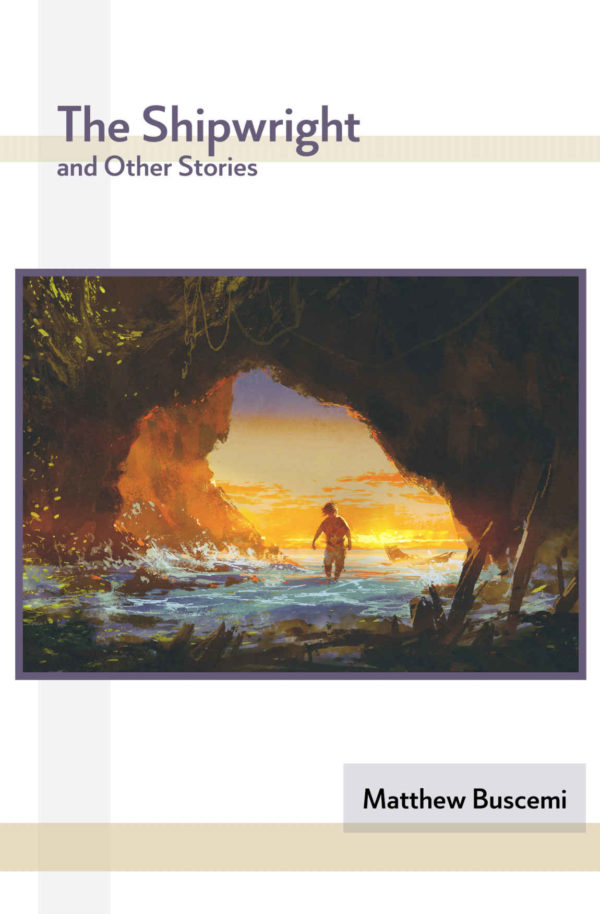Title: The Shipwright and Other Stories
Author: Matthew Buscemi
Genre: Fantasy
LGBTQ+ Category: Gay (one story)
Publisher: Matthew Buscemi Publishing
Reviewer: Scott
Get It On Amazon
About The Book
The Palípolian archipelago is a world of poets, warriors, philosophers, engineers, and wanderers.
Arkh Makhaino yearns to leave his island home of Khatap for the larger and busier mainland city of Épanngel, but worries that the Shipwrights’ Guild there will not accept him. Arkh struggles to resolve his lingering self-doubt while arduously waiting for a reply.
In other parts of Palípoli: a young man seeks a singular experience in the desert; an explorer’s return causes chaos for his guild and ideological upheaval for his city; what should have been a simple voyage for a young priestess turns into a nightmare at sea; a book from the Dark Archive is able to solve a philosopher’s plight—at a cost; and a young poet sets out on a journey to meet a kindred writer who once lived in his very home.
The Review
I just finished Matt Buscemi’s latest book, a collection called ” The Shipwright and Other Stories.” I loved his earlier collection “Lore and Logos,” which was mostly very shrot works, but had no idea what to expect from this new book.
There are six stories in the collection, each set in a different city in the Palípoli archipelago – a fantasy world with three moons. Matthew explains in the Notes at the end:
“The world of Palípoli differs from ours in that it has three moons rather than one. Palípoli has no system of magic, there are no fantastic creatures, and while the characters may believe in the intervention of various deities in their world, the happenings described in the stories are explicable with our own contemporary systems of science and rational logic. However the fictional potential of this seemingly tiny change of three moons was enormous. From it I was able to extrapolate and play with systems of religion, ethics, and culture that would not have been possible otherwise.”
And play with it he does. Although only one of the stories has an openly queer protagonist (the gay couple in “Something Novel”), all of the stories are fascinating, each revealing another layer of the world’s culture.
From the get-go, we’re dropped into Palípoli and left on our own to explore and to figure out this world’s religion and culture. Each story advances our understanding of the world a little more.
The title story, “The Shipwright,” opens in the fishing village of Khatap, and immerses us in the life of a young man learning to design ships for the city’s fishing fleet.
In “Simple Reason,” Buscemi tackles climate change and the damage humankind does to the world when it puts growth and profits above all else.
And “Rite of Courage,” possibly the least focused of the stories on account of its long stretch of time, still gives us an amazing warrior priestess (possibly asexual) character who I grew to love.
But it was the final story, “Something Novel” where Buscemi really hit his stride. There’s a back-to-the-start quality to it that gives the collection cohesion, connecting the end of this final story to ” The Shipwright.” I won’t say any more than that, but I found it very satisfying on several levels, like seeing an old friend again.
The last story is also the most nakedly autobiographical, The protagonist is a writer who struggles with criticism of his work, and the story explores themes of striving, self-recrimination, and ultimately triumph, albeit in an unexpected way:
“His writing was valuable to him, and it always would be. He could explain its worth to anyone who asked, and he would tell anyone who showed interest in it how proud he was it.”
It felt like the author was explaining his own writing journey, and he confirms this in the afterword. It’s a journey I can easily relate to.
The writing throughout the book is lyrical, often poignant, and although there is only one story with a clear queer character, there are a few that easily might be, and the lack of them didn’t detract at all from my enjoyment of the book. Although these are all short stories, they tell a narrative arc, each building on the last, so the overall effect is similar to having read a novel set in Palípoli. That said, I do hope Matthew follows his impulses and writes more (and longer) in this world. Matthew, are you listening? 🙂
Palípoli is a fascinating, beautifully painted place full of countercurrents, love, pain, stark distress and beauty. I’d love to spend more time there. Five stars.
The Reviewer
Scott is the founder of Queer Sci Fi, and a fantasy and sci fi writer in his own right, with more than 30 published short stories, novellas and novels to his credit, including two trilogies.

